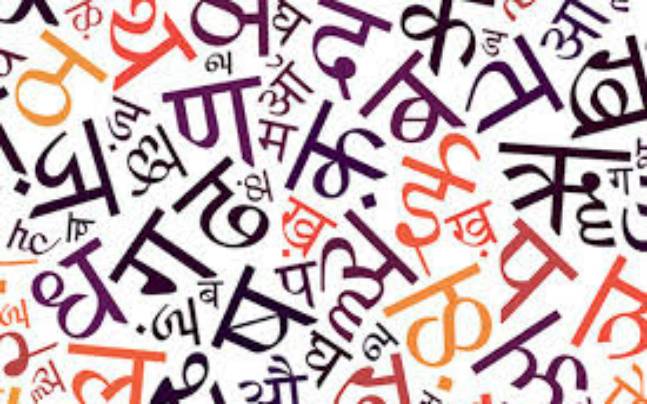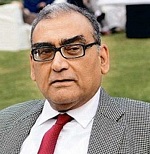
by admin | May 25, 2021 | News
 NEW DELHI – Launching the sharp attack on the central government over the farm laws, former Congress president Rahul Gandhi on Thursday said Prime Minister Narendra Modi is running the country on a “hum doh hamare doh” (we two, our two) policy refering to the two richest businessmen Mukesh Ambani and Gautam Adani .
NEW DELHI – Launching the sharp attack on the central government over the farm laws, former Congress president Rahul Gandhi on Thursday said Prime Minister Narendra Modi is running the country on a “hum doh hamare doh” (we two, our two) policy refering to the two richest businessmen Mukesh Ambani and Gautam Adani .
This policy, he said, has been in play in demonetisation, Goods and Services tax, lockdown and most recently, the three farm laws passed in September that have had the farmers across the country up in arms.
“You all must remember the saying we used for family planning — ‘Hum doh, humare doh’. This government has given that slogan a new meaning. The country is run by four people. ‘Hum doh, aur humaare doh’,” said Gandhi, who has so far kept his attacks on the BJP confined mostly to Twitter.
Gandhi, however, did not name anyone, declaring instead “everyone knows them”.
The farmers’ protest, he said, is not all that it appears. It is struggle for survival for many others too. “You all feel that this is a farmers’ protest, but you all are very wrong. This is India’s protest… the farmers are just leading the way,” he said.
This is because the farm laws, he said, will not only ruin farmers, but finish the middlemen and have a “devastating effect” on small shopkeepers, small businessmen. It will be a “massive blow” to small and medium enterprise, which will “destroy” India’s rural economy.
“India will not be able to generate growth, generate jobs… all because the backbone of our nation will have been destroyed for the benefit of ‘Hum doh, aur humaare doh‘,” Mr Gandhi added amid loud protests from BJP members.
There was constant heckling and disruptions from BJP MPs as Rahul Gandhi progressed with his speech. To BJP members’ insistence that he stick to the subject of the debate – budget – Gandhi responded, “Agriculture is also part of the budget”.
“The intent of the first farm law is to ensure that farmers’ produce is sold to a top few industrialists – one of whom is known by all as the government’s first friend. The intent of the second farm law is to ensure the benefits of the law go to the second friend,” Gandhi said.
“The intent of the government is clear – they want to break the backbone of India by breaking the farmer, labourer, small shop owners, middleman, and feed the pieces to these friends – the top industrialists,” added the Congress leader, whose party has been firmly backing the farmers’ protest.
“The farmers and labourers of this nation will destroy you. You will never win against them. The farmers will not move an inch back… you will have to repeal these laws. You will lose in the end, that is certain,” he added.
The BJP’s Anurag Thakur, who followed Gandhi, hit out saying that the Congress leader could not speak on the budget as he was not prepared.
“How would they (be prepared)? They are hardly seen in the House. Even during the Budget, they were missing for a long time. How would they be able to speak about it? Some people stay less in Parliament, just like they stay less in the country. Even as I am speaking, these people are leaving the Parliament because they are not in a habit of sitting in Parliament,” he said.

by admin | May 25, 2021 | Opinions

Asad Mirza
By Asad Mirza
After tolerating four years of tantrums, mood swings and fits, bad language, and the worst idiotic and overtly racist behaviour when defeated by any US president, the world keenly awaited the change of power in the oldest democracy in the world when Joe Biden took over as the new American president.
Similarly, the world keenly looked forward to under standing the contours of the new administration’s internal and external policies, particularly its foreign policy. In a wide-ranging address at the US State Department in Washington last week, Joe Biden outlined his new foreign policy vision, reiterating the catch phrase – “America is back.”
This stance was reflected in the words that Biden used, such as ‘re-build’ (America’s alliances) and ‘re-engage’ (with the world).He also sought to outline a clear vision of what the new administration aims to achieve in order to improve and stabilise international relations. It was a speech designed to re-establish order and global faith in the US; things that Biden clearly feels were lost under his controversial predecessor.
Michelle Bentley, Reader in International Relations at Royal Holloway University,
London opines that the US foreign policy will now focus more on multilateral diplomacy and working with other nations in a more positive way. But Biden hinted that this should not be considered a ‘soft approach’, insisting that diplomacy would be the best way to get what the US wants. He also tried to highlight the importance, which his administration attaches to democratic values and described it as a key aspect of America’s identity and ethos.
During his first year in office, President Biden will bring together the world’s democracies to strengthen the global democratic institutions, and forge a common agenda to address threats to common democratic values. Biden has explained that the so-called ‘Summit for Democracy’ he plans to convene later this year, will focus on fighting corruption and authoritarianism and protect human rights world over.
The Summit will also issue a Call to Action for the private sector, including technology corporations and social media giants, to make their own commitments, recognising their responsibilities and their overwhelming interest in preserving open, democratic societies and protecting free speech.
Indo-US Ties
James Traub of NYU’s Center on International Cooperation, opines that in Asia India has a geopolitical status of all its own. The world’s fifth-largest economy, India serves as a bulwark against China, which the Biden administration regards as America’s most dangerous adversary. And because China increasingly seeks to export its model of authoritarian, state-run capitalism, China also poses a unique threat to democracy, which the new administration will definitely try to weaken.
The Biden administration has inherited from Trump the premise of an ‘Indo-Pacific’ region with India at its core. In the recent past, as relations between New Delhi and Beijing soured, India strengthened its commitment to a multilateral partnership with the United States, Japan and Australia — known as the Quadrilateral Security Dialogue, or Quad.
China has castigated this forum as an Asian version of the NATO, or one which is directly aimed againstit. India, though cautious of formal alliances was initially hesitant to fully engage, as it also didn’t want to sour its trade relations with Beijing.
The US considers India as “one of the most important partners in the Indo-Pacific region” and says it welcomes its emergence as leading global power.”India is one of the most important partners in the Indo-Pacific region to us. We welcome India’s emergence as a leading global power and its role as a net security provider in the region,” US State Department spokesperson Ned Price said during a press briefing, earlier this week.
In addition, Kurt Campbell, the China hawk whom Biden recently appointed as the ‘Indo-Pacific Coordinator’ at the National Security Council, has reportedly proposed forging a new system of alliances binding South and East Asia, and Asia and Europe, as well as of incorporating India, South Korea, and Australia into the G-7 to form a new ‘D-10’—the ten great democracies.
This further strengthens the importance which US attaches to India but it will also keep a strict watch on the internal political developments in India, particularly related to minorities. Though the personal equation, which existed between Trump and Modi, might be missing under the new dispensation yet it may not afford to ignore India.
Also, the new administration will not be able to drastically alter its policy toward India as the US needs its help to counter China in the region and also increasingly values India as a military and trade partner.
Mr. Biden, who once spoke optimistically of China’s emergence “as a great power,” has become increasingly tough on Beijing, and some analysts said his administration would most likely use the Quad as a way to ensure that the balance of power in the Indo-Pacific region does not tilt too far toward China.
Still, in New Delhi there is a school of though which feels that the new administration might not be as tough on China as the previous one and that Mr Biden might be forced to adopt a more nuanced and less favourable position toward India.
In addition, the United States has been trying unsuccessfully to increase arms sales to India, but the country’s history of buying weapons from France, Israel and Russia, has complicated that effort. There is an added US concern that providing military equipment to India might help Russian military or other foreign agents to have access to the US technology.
Other issues, which might have an impact on the relationship, are the visa and climate change issues. The outgoing president had earlier this year suspended H-1B visas for high-skilled workers, a major setback for American IT sector, which employ many Indians. US will also require the Indian support and cooperation on its initiative on climate change issues and in addition both countries are trying to hammer out a mutually beneficial Trade Agreement, whichhas eluded the officials so far conducting the talks.
However, there are signs that the next phase of the US-India relations will be based more on substance and less on rhetoric as India, now is able to offer much more to the us, both in military, security, trade and technological terms. The ties might not be personality oriented but focussed more on changing hard realities and individual aspirations, particularly in the post-Covid changed world.

by admin | May 25, 2021 | Muslim World
 Aligarh: As the Government of India for the first time allowed universities to offer fully online degrees as part of a push to widen access to higher education and to raise the profile of Indian institutions globally, Aligarh Muslim University (AMU) became an ‘early mover’ in the online education space after being granted permission to start online B.A, B.Com, M.A and M.Com courses from the current academic session. The courses will be offered by the Centre for Distance and Online Education (CDOE).
Aligarh: As the Government of India for the first time allowed universities to offer fully online degrees as part of a push to widen access to higher education and to raise the profile of Indian institutions globally, Aligarh Muslim University (AMU) became an ‘early mover’ in the online education space after being granted permission to start online B.A, B.Com, M.A and M.Com courses from the current academic session. The courses will be offered by the Centre for Distance and Online Education (CDOE).
AMU is one of the first select few universities to begin online courses after meeting all the pre-requisites of the UGC (Open and Distance Learning Programmes and Online Programmes) Regulations, 2020.
In accordance with the National Institutional Ranking Framework (NIRF) norms, only the universities accredited by the National Assessment and Accreditation Council (NAAC) with at least a score of 3.01 out of 4 or ranking in the ‘Top 100’ were eligible to apply for running the online programmes.
“With the introduction of online graduation and post-graduation courses at the CDOE, AMU will have a global outreach and this development shall herald a new era in the march of CDOE towards its goal of providing quality and affordable education to all,” said AMU Vice Chancellor Prof Tariq Mansoor.
He added that allowing universities to offer fully online programs is a significant development.
“The fully online degrees can increase enrollment and completion, while at the same time reduce barriers to entry. Online degrees will be offered at lower cost and will likely appeal to working adults who are unable to pursue on-campus degree programmes,” said Prof Mansoor.
He pointed out that AMU has the required smart state-of-the-art technology oriented learning model with E-Learning Resources drafted by experts to run the online courses.
Prof M Nafees Ahmad Ansari (Director, CDOE) pointed out that these online courses are open to candidates from all over the country and abroad.
“Indian students will have to pay the fees in Indian Rupee (INR) and provide their Aadhar card details; whereas the students in distant countries will be required to pay the fees in US Dollars with the requirement of their passport details,” he said.
Prof Nafees added that application requirements for online programmes are more flexible compared to on-campus degrees. The submission of admission applications, registration of classes, carrying on coursework and assignments and the taking of exams will be all done online without the physical presence of the students.

by admin | May 25, 2021 | Opinions
 By Justice Markandey Katju
By Justice Markandey Katju
Hindi is an artificially created language, and is not the people’s language. The common man’s language ( in large parts of India ) is Hindustani ( also called khadiboli ).
What is the difference between Hindustani and Hindi ?
To give an example, in Hindustani we say ‘Udhar dekhiye‘, while in Hindi we say ‘Udhar avalokan keejiye‘, or ‘Udhar drishtipast keejiye‘.
The common man would never say ‘Udhar avalokan keejiye‘ or ‘Udhar drishtipaat keejiye‘, and it is often difficult to read books written in ‘klisht’ Hindi.
Thus Hindi was created artificially (by British agents like Bhartendu Harishchandra) by hatefully removing Persian or Arabic words which were in common usage in Hindustani and replacing them by Sanskrit words which were not in common use, e.g. ‘munasib’ or ‘wajib’ was replaced by ‘uchit’, ‘zila’ by ‘janpad’, ‘itraaz’ by ‘aapatti’, ‘ehtiyaat’ by ‘saavdhani’, etc.
Hindi was created in furtherance of the British divide and rule policy
Hindi was created in furtherance of the British divide and rule policy, depicting Hindi as the language of Hindus and Urdu of Muslims ( when the truth was that the common man’s language was, and still is, Hindustani or Khadiboli, while Urdu was the language of the educated class, whether Hindu, Muslim or Sikh upto 1947 in large parts of India ).
It is a mistake to think that a language becomes weaker if it adopts words from another language and makes it of common usage.
In fact, it becomes stronger. Thus, English became stronger by adopting words from French, German, Arabic, Hindustani, etc, and Tamil became stronger by adopting words from Sanskrit. So also, Hindustani became stronger by adopting Persian and Arabic words.
The bigots who tried to remove these words and create an artificial language did great disservice to the nation, and only served the divide and rule policy of dividing Hindus and Muslims. ( Source : Facebook post of Justice Katju)

by admin | May 25, 2021 | News

By Pervez Bari
NEW DELHI: The National Executive Council (NEC), meeting of the Popular Front of India (PFI), in a statement has deplored the explicitly vindictive actions by central financial agencies selectively against the organization.
The PFI in a release said the meeting pointed out that the steps being taken by Income Tax Department and Enforcement Directorate (ED) as per dictates of the RSS-BJP Government are aimed at stifling the ongoing activities of Popular Front for empowering the backward and marginalized Indian Muslim community.
Under the cover of an ill-motivated ECIR registered against the organisation, the ED has been running behind Popular Front since past several months with all sorts of harassments like notices, summons, recording statements and conducting raids in offices and residences of leaders all over India. But the overwhelming support the organization received in response to such erroneous misadventures proved that ED has no credibility left in the eyes of the public other than that of a political tool under the control of a highly communalized government, the release said.
Now, it is noticed that the Income Tax (IT) Department has also started acting as a tool of political vendetta, forgetting the decorum, rules and regulations governing their functioning. Popular Front of India is a registered organisation with lawful and transparent financial dealings. It has been abiding by all statutory requirements, and annual IT returns have been regularly filed before the authorities. The organization is aware of the legitimate powers of the IT Department in seeking clarifications and even punishing in cases of serious violations.
Meanwhile, the IT Department has asked Popular Front to furnish reasons for not withdrawing the benefits now being enjoyed under Sec 12(A) of Income Tax Act just like any other lawful society. Surprisingly, the contents of the IT show-cause notice that has been recently issued to Popular Front are highly prejudiced and indicative of the well-orchestrated agenda of the Central government against the religious minority groups that refuse to dance to the tune of authoritarianism and communal fascism.
The charges levelled against the Popular Front in the IT notices are so baseless and flimsy that they only expose the arrogance and prejudices it has co-opted from the agenda of the present BJP government controlled by RSS. They include allegations such that only community members are the beneficiaries of Popular Front scholarships and that Hadiya case was supported by the organisation. Astonishingly, the onus of some of the listed donors not submitting their IT returns is also put on the shoulders of the organisation. Popular Front has furnished due reply to the said notice through proper channel and is in waiting for equal justice from the IT Department, without prejudice, on par with their approach to other social organisations.
The NEC meeting of Popular Front of India has called upon the people not to be misled by the vilification and witch-hunt move of the present government by selectively misusing the financial institutions like Income Tax Department and Enforcement Directorate. They are acting in a biased manner, not only against one organisation but all minority groups as well as all voices of political dissent.
Farmers’ Protest
Meanwhile, in another resolution, the NEC meeting of Popular Front of India has urged the Central government to withdraw the controversial, corporate-serving, anti-farmer laws immediately and reminded that the repressive measures adopted at present would only worsen the situation of the society and the government itself.
The meeting has urged all units, members, and associates of the organisation to join Popular Front Day celebrations on February 17 and the ongoing related campaigns across the country. Various programmes like handbill distribution, house visit, public meeting, rally, Unity March etc. will be held in different states. It was on this day in 2007, Popular Front of India was launched as a national movement by bringing together state organisations working with similar objectives. Chairman O M A Salam presided over the meeting while General Secretary Anis Ahmed presented the reports.

 NEW DELHI – Launching the sharp attack on the central government over the farm laws, former Congress president Rahul Gandhi on Thursday said Prime Minister Narendra Modi is running the country on a “hum doh hamare doh” (we two, our two) policy refering to the two richest businessmen Mukesh Ambani and Gautam Adani .
NEW DELHI – Launching the sharp attack on the central government over the farm laws, former Congress president Rahul Gandhi on Thursday said Prime Minister Narendra Modi is running the country on a “hum doh hamare doh” (we two, our two) policy refering to the two richest businessmen Mukesh Ambani and Gautam Adani .





